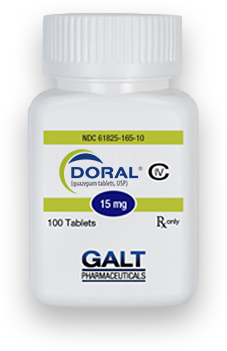About Doral®

What is Doral®?
Doral® is a prescription sleep medicine indicated for the treatment of insomnia characterized by difficulty falling asleep, frequent nocturnal awakenings, and/or early morning awakenings.
Why Doral®?
Doral® is a medication for insomnia that helps with all three important components of sleep:1
- Difficulty Falling Asleep (DFA)
- Difficulty Staying Asleep (DSA)
- Early Morning Awakening (EMA)
How Doral® helps with Difficulty Falling Asleep?1,2,3,4,5
In clinical studies, Doral® was effective in:
- Significantly increasing total sleep time and percent sleep time
- Decreasing sleep latency and total wake time
How Doral® helps with Difficulty Staying Asleep?1,2,3,4,5
Doral’s unique pharmacokinetic profile helps patients with symptoms of frequent nocturnal awakening by:
- Decreasing the number of nocturnal awakenings
- Decreasing wake time after sleep onset
How Doral® helps with Early Morning Awakening?1,2,3,4,5
In clinical studies, Doral® was effective in:
- Reducing wake time
- Increase percent sleep time
The main adverse events seen with Doral® during clinical trials are daytime drowsiness, headache, fatigue, dizziness, dry mouth, and dyspepsia. Adverse events are dose related and can have additive effects when used with other CNS depressants, including alcohol. Complex sleep-related behaviors (e.g. sleep-driving with accompanying amnesia) have been reported with the use of sedative-hypnotics.
These behaviors can occur with initial treatment or in patients tolerant of Doral® or other sedative-hypnotics. Elderly and debilitated patients may be more sensitive to benzodiazepines, so caution is advised in their use. Avoid abrupt discontinuation in at-risk patients of benzodiazepine withdrawal syndrome, particularly patients taking higher than recommended doses over an extended time.
- Doral® [package insert]. Atlanta, GA: Galt Pharmaceuticals; 2017.
- Kales A, Bixler EO, Soldatos CR, Vela-bueno A, Jacoby JA, Kales JD. Quazepam and temazepam: effects of short- and intermediate-term use and withdrawal. Clin Pharmacol Ther. 1986;39(3):345-52.
- Kales A, Bixler EO, Vela-bueno A, Soldatos CR, Niklaus DE, Manfredi RL. Comparison of short and long half-life benzodiazepine hypnotics: triazolam and quazepam. Clin Pharmacol Ther. 1986;40(4):378-86.
- Kales A, Bixler EO, Soldatos CR, Vela-bueno A, Jacoby J, Kales JD. Quazepam and flurazepam: long-term use and extended withdrawal. Clin Pharmacol Ther. 1982;32(6):781-8.
- Mendels J. Evaluation of the safety and efficacy of quazepam for the treatment of insomnia in psychiatric outpatients. J Clin Psychiatry. 1994;55(2):60-5.

 What Is Doral®?
What Is Doral®? Safety Profile
Safety Profile